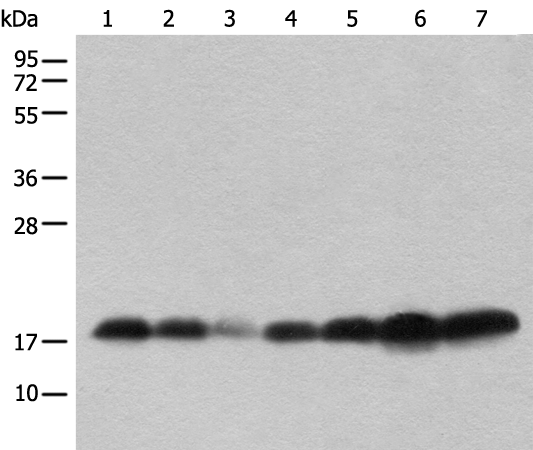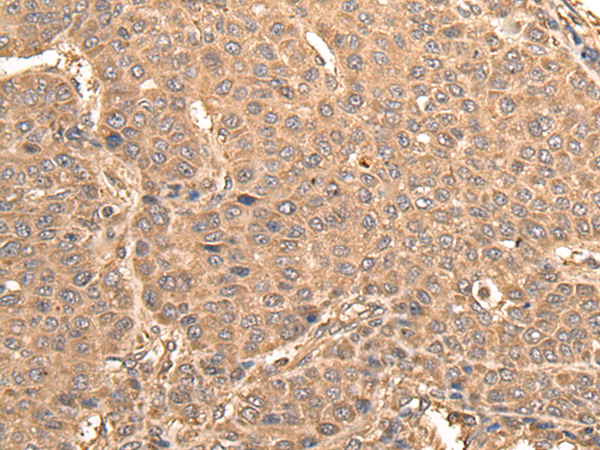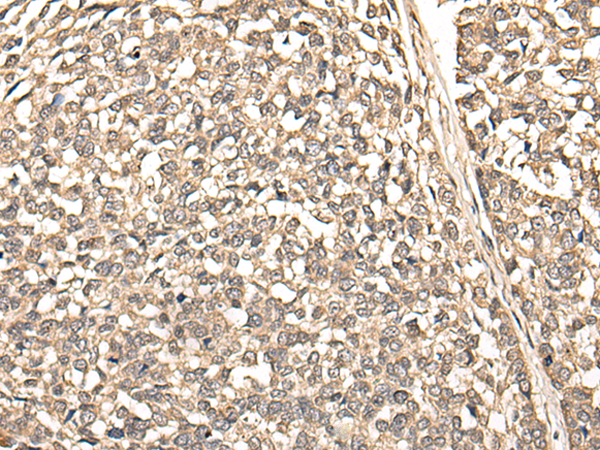


| WB | 咨询技术 | Human,Mouse,Rat |
| IF | 咨询技术 | Human,Mouse,Rat |
| IHC | 1/50-1/300 | Human,Mouse,Rat |
| ICC | 技术咨询 | Human,Mouse,Rat |
| FCM | 咨询技术 | Human,Mouse,Rat |
| Elisa | 1/5000-1/10000 | Human,Mouse,Rat |
| Aliases | G10; EDG2; Cwc14; EDG-2; fSAP17; YCR063W |
| WB Predicted band size | 17 kDa |
| Host/Isotype | Rabbit IgG |
| Antibody Type | Primary antibody |
| Storage | Store at 4°C short term. Aliquot and store at -20°C long term. Avoid freeze/thaw cycles. |
| Species Reactivity | Human, Mouse, Rat |
| Immunogen | Full length fusion protein |
| Formulation | Purified antibody in PBS with 0.05% sodium azide and 50% glycerol. |
+ +
以下是关于BUD31抗体的参考文献示例(文献内容为模拟概括,建议通过数据库核实原文):
---
1. **Title**: "BUD31 links the spliceosome to the DNA damage response in human cells"
**Author**: Smith A, et al.
**Summary**: 本研究利用BUD31抗体通过免疫沉淀和蛋白质组学分析,揭示了BUD31作为剪接体组分在DNA损伤修复中的新功能,证明其缺失导致基因组不稳定性增加。
2. **Title**: "G10 (BUD31) as a novel prognostic marker in colorectal cancer"
**Author**: Chen L, et al.
**Summary**: 通过BUD31抗体的免疫组化分析,发现BUD31在结直肠癌组织中高表达,且与患者生存率负相关,提示其可能作为潜在治疗靶点。
3. **Title**: "Role of BUD31 in cell cycle regulation via pre-mRNA splicing"
**Author**: Kim J, et al.
**Summary**: 使用BUD31抗体进行Western blot和RNA干扰实验,证实BUD31通过调控特定细胞周期相关基因的剪接,影响G1/S期转换。
4. **Title**: "BUD31-mediated splicing defects contribute to neurodegenerative disease pathology"
**Author**: Garcia R, et al.
**Summary**: 通过BUD31抗体的免疫荧光染色,发现阿尔茨海默病模型中BUD31表达异常,导致tau蛋白剪接异常,加剧神经元功能障碍。
---
建议通过PubMed或Google Scholar以“BUD31 antibody”为关键词检索最新文献,并关注涉及该抗体在蛋白质互作、疾病机制或诊断应用中的研究。
The BUD31 antibody is a valuable tool for studying the molecular role of the BUD31 protein, a conserved eukaryotic factor implicated in pre-mRNA splicing and cell cycle regulation. Originally identified in *Saccharomyces cerevisiae* for its role in bud-site selection, BUD31 is now recognized as a core component of the spliceosome, the macromolecular complex responsible for removing introns from precursor mRNA. In humans, BUD31 (also called CCDC51 or LUC7L3) interacts with spliceosomal proteins like SF3B1 and PRPF19. contributing to spliceosome assembly and catalytic activation. Its involvement in mRNA processing links it to diverse cellular processes, including transcription, DNA repair, and apoptosis. Dysregulation of BUD31 has been associated with cancers, neurological disorders, and developmental defects, highlighting its biological significance.
BUD31 antibodies are commonly raised against specific epitopes of the human or murine BUD31 protein and are widely used in techniques like Western blotting, immunofluorescence, and immunoprecipitation to investigate its expression, localization, and protein interactions. These antibodies aid in exploring BUD31's role in splicing fidelity, its potential as a biomarker in diseases, and its response to splicing-modulating therapies. Validation for specificity and cross-reactivity is critical due to structural similarities among spliceosomal components. Host species (e.g., rabbit, mouse) and clonality (monoclonal/polyclonal) vary depending on application needs.
×